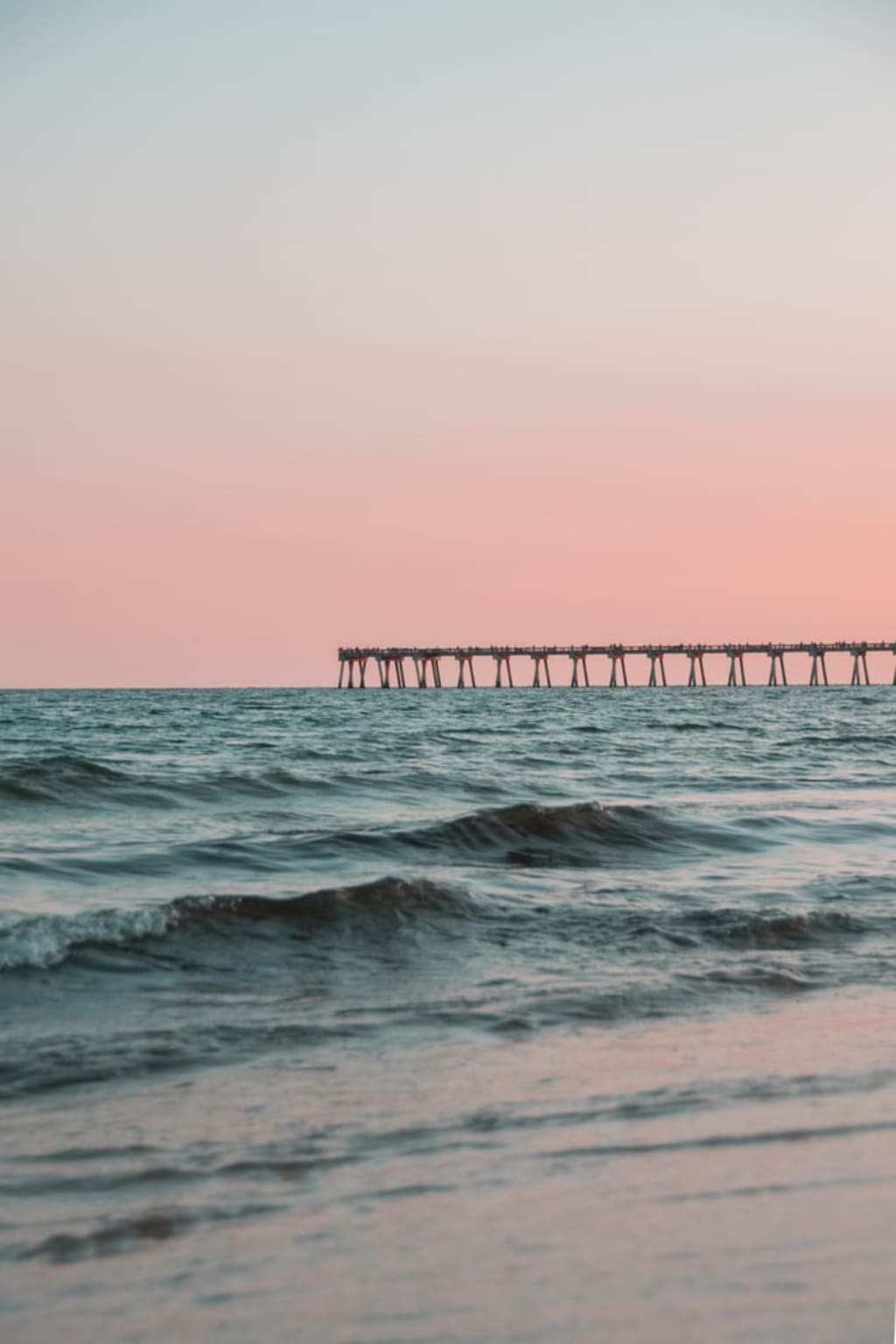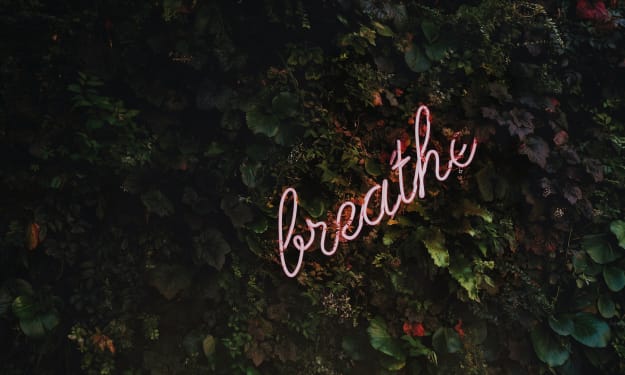
When Moira’s boss Donald died, she went to the beach. The call came early in the morning, before work. Sam, one of the other managers, told her the news. “It’s the cancer,” he said. “He didn’t wake up this morning.”
Moira didn’t cry when she heard the news. It was too hot out to care. The heat came down in thick gusts of hot wind, humid and suffocating. It sent waves of heat off the asphalt, burning the bare feet of tourists who stumbled onto the beach, throwing themselves into the cool arms of the ocean waves. Her clothing clung to her body, her hair frizzy and tangled. Sam gave her the day off to grieve and yet, she did not want to cry. She was exhausted. Every step, every raise of the arm, felt like pushing against a meaty sheet of warmth. She did not want to cry, to send warm streams of salt to mix with the sweat that poured down her face. But the grief followed her around the house like an elusive housecat, sometimes jumping out from behind corners to surprise her. She wanted to escape, lose its trail, so she found her easel and her paints and her brushes and headed to the beach, setting herself up on the sand.
She scanned the beach with her eyes, searching for her subject. The bodies were packed onto the beach like cattle awaiting their sentence. They came in all shapes and sizes, tall and short, thin and fat, old and young, each body a mess of skin and flesh and sweat. Some lay on the beach, avoiding movement, letting the sun eat away at their skin. Some swam in the water, cooling themselves off from the sun that beat down on the sand relentlessly. Some threw balls and frisbees, back and forth, taking a stand against the heat. The bodies were a cacophony of sound, each body a note in the symphony of the sand.
Moira caught sight of a young girl, huddled on a dune of sand a little ways off. She was watching, peering over the ledge of the dune at the bodies below. She trained her eyes on body after body, scanning the beach. She seemed in a sort of ecstasy, taking in these bodies. She looked this way and that, staring and peering and ogling, her eyes never leaving the bodies. A small mark of sweat stained her grey t-shirt, but she made no move to cool herself. She simply sat, and stared, and sweat, taking in the bodies with hunger.
She wasn’t quite sure why, but the girl reminded Moira of herself. She peered at the bodies with an intense inquisitiveness, the eyes of an artist, all youthful and innocent. She was not judging the bodies, not the big ones or the small ones or the dimpled ones or the hairy ones. She was simply staring, watching, waiting. Her eyes held a glow that spoke of untold secrets, unspoken curiosities, unknown wonders.
Moira remembered a conversation she had had with Donald several years ago. It was the end of the day. Everyone was grabbing their briefcases and purses and heading out. Moira was finishing up some emails when Donald approached her silently, placing a book in front of her.
“Look at this,” he said. Moira paused her work. She peered at the page.
“Wow,” she said, with a gasp. The page was a full spread photo of cave paintings, exotic and tall and striking. The description placed the caves somewhere in France, Lascaux. There were bulls, horses, large strikes of black against the cool grey of the cave walls. They appeared almost burned, a stain against the rock. One painting was a collection of a hundred hands, red and orange and amber. As she stared at them, they seemed to move, waving hello, whispering of the tales they could tell.
“Isn’t it beautiful?” Donald asked, staring over her shoulder at the page.
“It is,” she said. “What is it?”
“Cave paintings,” he said. “They’re from France. Discovered in 1940. They date back to almost 30,000 BCE.”
“Wow,” Moira said. She wasn’t sure what else she could offer.
“I’ve always wanted to go,” Donald confessed. “Bea and I. We were going to go together. See the caves, the paintings. We wanted to see them in person.”
“Why haven’t you?” Moira asked, innocently. Donald stopped, staring at her.
“You know how it goes. You plan these trips when you’re young. Before the jobs. Before the house. Things just, just got in the way, I suppose,” Donald offered. “Haven’t you ever given up on a dream?” Moira felt herself shrink slightly.
“Yes,” she confessed. “I suppose I have.” A silence fell upon the room, the sound of the fax machine the only noise.
“Well, what was this dream deferred?” Donald prompted.
Moira smiled to herself. “A painter,” she said. “I wanted to be a painter.” She turned back to the page in front of her, flipping through the book, staring at painting after beautiful painting. The sights brought tears to her eyes as she remembered how she used to dream.
“Really?” Donald asked, looking at her with a small smile of satisfaction across his lips.
“Yes,” she said.
“Were you any good?” he asked, still smiling. Moira laughed.
“I suppose I was,” she said. “But I haven’t painted in years.”
“Why not?” Donald asked. Moira smiled.
“You know how it goes. The job. The house. The husband. The kids.”
“Well, your kids are grown now. You could still paint,” said Donald.
“You could still travel,” she countered.
“Ah, but see, that’s different,” Donald said. His eyes smiled, playing along.
“How so?” she asked.
“You can paint anywhere. You can have a job and paint. I would need to leave everything,” he said. Moira considered.
“True,” she agreed. “But a dream is a dream.” It was a weak response, but seemed to strike a chord with Donald. He sat on the edge of her desk, considering.
“I suppose,” he said. He looked at her with a grin. “I’ll tell you what,” he said. “When you paint, I’ll travel.”
“Deal,” she agreed. They laughed and Moira gathered her purse, turned off the computer, and headed out for the day.
She did not paint after that, not for several years. Not until the news of Donald’s death came and she escaped to the beach for relief. Cobwebs still clung to her easel. Her paints were dry and dull. She had to poke through the top with a pencil to access the wet paint below. Her brushes were stiff. Her hands were stiff. As she took her brush, and began painting the blue sky, she found herself struggling to remember how to blend, how to stroke the canvas as she used to.
She trained her eye on the beach before her and began to paint. She painted in thick strokes. She did not aim for realism. She did not paint the girl as she saw her standing before her. She painted only how she felt. She painted how the sunlight struck the sand like a punishing father, how the breeze floated by with a giggle. She painted how the girl stared, her eyes wide and bulging, at the bodies on the beach, each body a stroke on the canvas. Thick strokes, thin strokes, tall strokes, short strokes, she painted each body as she saw it, all movement and skin and heat.
She paused when she came to the girl. She did not know how best to represent her, how best to represent Moira. For it was clear, in that moment, that that girl was Moira. She did not know how time worked, how she was seeing herself as a young child after all these years, but she knew with an eerie certainty, like how her knees would ache when it was going to rain, that she was staring at herself. The eyes. The stare. The glee at the sight before her. This girl was Moira, and Moira was this girl.
Moira scanned her feet, searching the sand. She found a piece of broken metal, supposedly from a can of pop discarded by a lazy tourist. She picked it up, knicking her finger on the sharp edge. It was hot, but as she held it up to her eye, she found herself reflected back. She could see her eyes, the wrinkles around them, the skin sagged and spotted by the sun. She could see the furrow between her brows, an omnipresent of the time that had passed. She stared between herself, between the girl, between dreams and dreams deferred, dreams resurrected. She took the piece of the can and glued it to where the girl’s body should be. In it, she saw herself.
She stared at the painting, a surge of confidence washing over her. She had painted, after all this time. As she stared at the canvas before her, the thick strokes of paint a mess of colour, she felt herself grow young again. And yet, it did not feel right. It did not feel complete. She scanned the horizon, looking for what was missing. She saw a small white ship crashing against the waves, bobbing along the skyline, and in its youthful buoyancy, she thought of Donald.
She remembered Donald’s eyes, that gleam of hope dulled by the briefcases and offices and suits. She remembered his smile, the kindness that promised to always seek adventure. And she thought of his promise. When you paint, I’ll travel. Moira took her brush and dipped it in the white paint. She drew a thick stroke of white on the horizon line for the boat, for Donald, and sat back to examine her piece. It was finished. She had painted. She let herself feel proud, feel young, let the wave of passion that had been missing for so long return at last like the prodigal son, and watched as the boat disappeared into the horizon, searching for lands long lost.
About the Creator
Molly Dunn
Molly Dunn is a writer from Toronto, Canada. Her previous work has been published in Meat for Tea: The Valley Review, Penumbra Literary and Arts Journal, Mnerva: Read the Mike, and featured on A Moment of Your Time Podcast.
Enjoyed the story? Support the Creator.
Subscribe for free to receive all their stories in your feed. You could also pledge your support or give them a one-off tip, letting them know you appreciate their work.





Comments
There are no comments for this story
Be the first to respond and start the conversation.